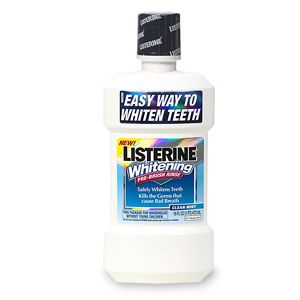
Whiter Teeth with Teeth Whitening Mouthwashes
I have written on more than one occasion about how many over-the-counter whitening products are less efficient at whitening and less healthy for your teeth. That said, I realize that many of you want to use your whitening mouth rinses despite my best efforts to dissuade you. If you are going to do something unhealthy for your teeth anyway, I at least want to give you a practical approach that allows you to be as kind as possible to your teeth in the process.
Whitening Rinses Work in the Following Ways:
- They dissolve the enamel pellicle and any associated surface stains using hydrogen peroxide, and mild acids (usually phosphoric or citric acids).
- Some try to inhibit the formation of new tooth stains by using some type of pyrophosphate to prevent stains from sticking to teeth.
Some Things of Note:
- The hydrogen peroxide present in teeth whitening mouthwashes will not penetrate your teeth in a meaningful way (most of the hydrogen peroxide reacts with your saliva and not with your teeth). For some this can mean less overall sensitivity, but it also means you will only have an effect on surface stains (note the claims on the bottles). The acidic pH of the rinses will enhance this dissolving action, but can produce some sensitivity through erosion.
- Although the pH’s of whitening rinses vary and sometimes aren’t completely terrible, I have two big issues with regular use. Frequent acidic events cause acid-sensitization of oral bacteria and favor the growth of nastier acid-producing bacteria. Additionally, daily dissolution of the enamel pellicle on your teeth with the whitening rinses will leave your teeth less resilient to normal daily variations in pH since your enamel pellicle will be less developed.
- Branded rinses are not all that different than standard topical hydrogen peroxide you find at the store. Topical hydrogen peroxide is usally a little more acidic than some whitening rinses (pH 4.4), but they result in essentially the same outcome.
- Avoid using Pre-Brush teeth whitening rinses (you can still use rinses labeled as pre-brush rinses after brushing if you want). The abrasion of brushing after using an acidic rinse will scrub away microscopic layers of enamel, which can add up with time. Abrasion is a big danger to acid softened teeth.
- Avoid whitening rinses containing citric acid. Citric acid chelates/binds calcium and will be more detrimental to your teeth than some of the other acids you might find in these mouthwashes. Usually citric acid will be present in whitening mouthwashes that contain pyrophosphates, but with how we’ll be using our whitening mouthwashes it won’t matter whether or not the rinses contain pyrophosphates.
- Stains accumulate on your teeth slower than you might think, and there is a lot to be gained by limiting the frequency of whitening products.
Step by Step Instructions for Using Teeth Whitening Mouthwashes:
- Brush first then spit, and do not rinse with water. The residual fluoride in your mouth from your toothpaste will provide additional buffers to acids in the whitening rinses.
- Swish with the tooth whitening rinse of your choice as directed.
- Re-Balance your pH immediately after using the tooth whitening rinse. I also recommend using alkaline rinses an additional 2-3 times throughout the day on days you use a whitening rinse. This will help create positive pH pressures on your oral bacteria and help offset the additional daily acids in the whitening rinses.
- Don’t use the whitening rinses indefinitely, take a few weeks off and allow your enamel pellicle to re-establish itself and your teeth to rest. This means you are using your whitening mouth rinse mainly to remove surface stains and not to prevent stain accumulation. Unless there are other complicating factors like smoking, which accelerate stain formation, your teeth will likely remain noticeably whiter for at least a few months.
The healthiest, most controlled tooth whitening, with the greatest color stability, happens at your orthodontist’s office. Whitening mouth rinses are not something I recommend using, but at least with some of these tips people who want to use them can limit the negative effects these rinses may have on their teeth.